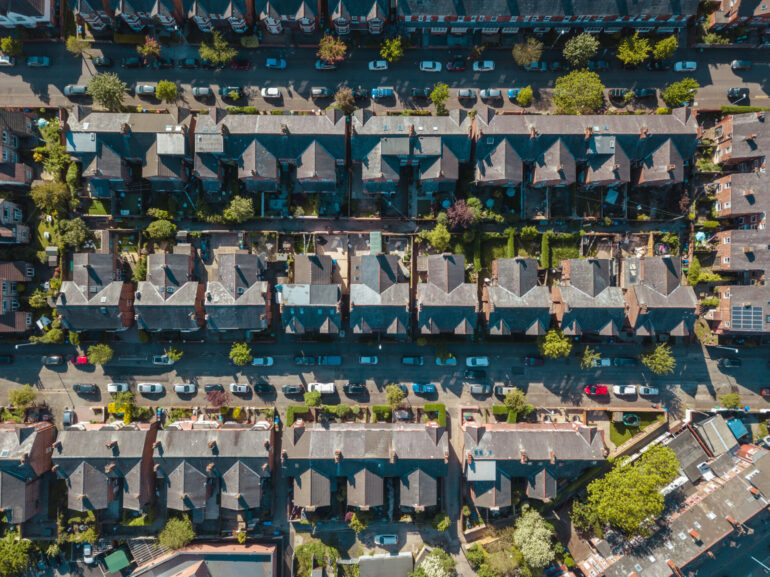Average house prices increased by 1.9% in the 12 months to May 2023, down from a revised 3.2% in April 2023, according to the latest figures from The Office for National Statistics (ONS).
The average UK house price was £286,000 in May 2023, £6,000 higher than 12 months ago.
However, this figure remained £7,000 below the recent price peak in September 2022.
Average house prices increased to £304,000 in England (1.7%), £213,000 in Wales (1.8%), £193,000 in Scotland (3.2%) and £172,000 in Northern Ireland (5.0%).
The North East saw the highest annual percentage change of all English regions in the 12 months to May 2023 (4.0%), while the East saw the lowest (0.0%).
Reaction:
Karen Noye, mortgage expert at Quilter:
“Despite the turbulence of the past few years, the housing market has remained resilient. However, the huge squeeze on affordability is now taking a real toll and downward pressure on house prices in the coming months is inevitable.
“The latest government house price index shows house prices were flat in May, down from a 0.5% uptick in April. What’s more, year on year prices increased by just 1.9%, down from 3.2% in the 12 months to April 2023.
“Given this morning’s figures only account for the 12 months to May 2023, they do not yet reflect the impact of the rapid spike in mortgage rates seen in recent weeks.
“Average 2-year fixed rate mortgages are now well above 6%, and people’s ability to afford their growing mortgage payments will be called into question, and prospective first time buyers may be put off by the prospect of committing to such high monthly rates.
“In the coming months, we could see those people who have overstretched themselves looking to sell their properties at a time when demand is heavily reduced.
“However, the recent Mortgage Charter will give homeowners a bit of breathing space and should limit the number of distressed homeowners being forced to sell their properties, so we are unlikely to see a flood of such sales.
“The past few weeks have been a particularly challenging time for the mortgage market, and we are thankfully now starting to see some semblance of normality resume as lenders stop the rapid readjustment of their rates.
“This morning’s lower than expected inflation figure will offer some relief to the Bank of England and interest rates are now forecast to rise less sharply as a result, but given inflation is still well above the 2% target it is unlikely that the Bank of England can take its foot completely off the pedal. If the BoE opts to push rates higher once again, this could cause significant damage to property prices as affordability is further squeezed.
“The housing market remains highly unpredictable, and anyone nearing the end of their current mortgage deal or looking to buy in the short term should therefore seek professional mortgage advice as soon as possible.”
Paul Glynn, CEO of Air:
“Given recent developments in the mortgage market, the slight flattening in May’s figures was to be expected.
“A gradual slowdown and a levelling out in house prices after the historic peaks of 2021 isn’t quite a cause for alarm.
“It is true the market outlook has been clouded by increases to the Bank of England base rate, but these efforts should act as a counterweight, pulling inflation downwards to a more manageable level.
“What matters most in the current flashpoint is that concerned consumers who read the forecasts have informed and proactive advisers to support them as they tackle these challenges.
“Affordability will continue to present a long-term challenge to both younger borrowers looking to step onto the ladder and older borrowers facing the prospect of ballooning mortgage repayments ahead of retirement.
“Now is not the time for borrowers or their advisers to follow well-worn paths without considering all their various options – whether these are taking advantage of the Government’s new measures or considering later life lending products.
“Being proactive is important and those who do so will benefit in the long term.”
Mike Stimpson, partner at Status:
“House prices in England have seen a monthly drop of 0.4% according to the Government’s House Price Index released this morning, taking the average property value down to £303,557.
“The data follows Halifax’s figures earlier this month which recorded a 3.5% annual drop and has sparked concerns that it could be the start of a house price crash, with the Resolution Foundation warning that house prices will plummet 25% if interest rates – and therefore borrowing costs – keep rising.
“Whilst lower house prices will be welcome news to those looking to get on the property ladder, this reduction poses additional pressures on those looking to sell as well as those planning on using housing assets for retirement.
“We surveyed 1,803 homeowners and on average, they are planning to use property to fund around half of their retirement, with one in 25 of those who own their home outright planning to rely on its value to fund 100% of their retirement.
“And if house prices continue to fall, and inflation and the cost of living continue to rise, this could place an unexpected strain on finances and retirement plans further down the line.”



